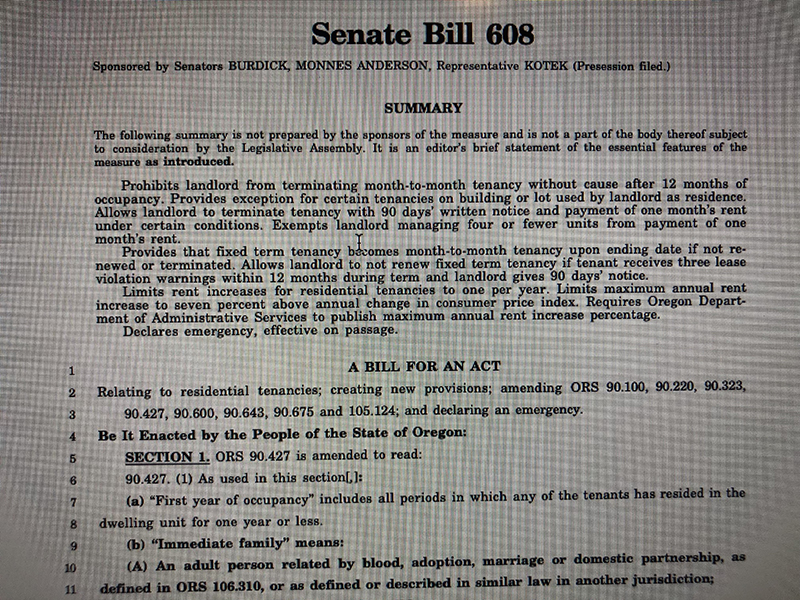Legislation that affects the world of investment properties is frequently changing. We at Trio Property Management work hard to maintain an up to date understanding of the laws to best suit the needs of our clients. This is a part of our mission to, “take care of your property so it will take care of you.” On February 28, 2019, this legislation experienced a large change when Oregon’s Governor signed Senate Bill 608 (SB 608) into law. Due to being declared through an emergency clause the law was put into action immediately. This change makes Oregon the first state to implement rent control statewide. SB 608 also made changes to tenancy time frames and to end of tenancy notices. These law changes can be complicated to understand so this blog post will walk through what this means for rental properties moving forward. This post is a summary of Trio’s understanding of the bill and is not legal advice. It is advised that you seek legal counsel for specific questions regarding this law or hire a professional property manager that is knowledgeable on these changes.
One of the major changes in SB 608 is the implementation of rent control. This legislation limits rent increases to 7% plus the Consumer Price Index (CPI). The CPI value is posted annually by September 30th for the coming year. For 2019 CPI is 3.3%. That means rent cannot be increased more than 10.3% (To see the CPI for Oregon click here: Oregon CPI). The cap on rent increases does come with a few caveats: there can be no rent increases in the first year of tenancy, homes less than 15 years old and homes where rents are in conjunction with a program or subsidy are exempt from the rent control cap, and under certain circumstances the rent control cap may pertain to the next tenancy. If rent is raised over the limit of the rent control cap there are penalties. The landlord may be liable for 3 months rent, actual damages, potential attorney fees, and defense against evictions based upon nonpayment.
The more complicated part of SB 608 relates to the ending of tenancies. SB 608 has placed limits on termination notices without stated cause. Under the law changes, a tenancy that is less than 1 year may still be terminated with a 30-day notice. But after the first year, fixed term tenancies roll to month-to-month unless the tenant desires a lease. At that time end of tenancy notices are prohibited other than a few exemptions. The general exemptions include: demolishing or converting the unit for commercial usage, major repairs or renovations, the landlord or their family will move in to the unit, or selling the unit to be used as a primary residence. If the property owner has more than 4 dwelling units then the tenant must be paid 1 month’s rent when the tenancy is ending for the above reasons. An end of tenancy notice may also be given if the landlord lives in the property and there are less than 2 units. After the first year of tenancy current for-cause notices can still be used to end tenancies. An additional option for a non-renewal notice now includes tenancies where 3 or more violations have occurred within a 12 month period. The 30-, 60-, or 90-day notice will apply depending on the situation. Again penalties for violation of the above no cause notice limits can be incurred. The penalties for violations regarding tenancy terminations may be: 3 months rent, actual damages, potential attorney fees, and defense against evictions.
An extra note of caution is that local laws that were previously in place regarding the end of tenancy and payments to tenants may still apply adding another level of complexity to these changes.
This summary is not a substitute for the new SB 608 nor for legal advice. To read the full language of SB 608 click here: SB 608. Due to the complexity and nuances of the new bill for those that are self managing it is recommended to seek legal council before taking action. Due to the costs of making mistakes and the time it takes to avoid those mistakes, now more than ever it appears cost and time effective to use a professional property manager. To contact Trio and see if we are a good fit for you click here: Trio link
Frequently asked questions by our clients:
Q: My property was rented in January 2019 and the lease is up in July 2019, what does this mean for me?
A: This means that the tenant will roll month-to-month as of August 1st with options to renew for a full year starting February of 2020. Rents will adjust as appropriate.
Q: My property rented June 1, 2018 and the lease expires June 30, 2019, how will this law affect my rental property?
A: Because the lease was more than 365 days, the tenant will be offered to renew at one year with a rent adjustment as dictated by the market.
Q: Why should rents be raised annually and how does that affect me as the owner?
A: Now that Oregon has implemented rent control it is more important than ever to maintain the rent rate annually. If rent isn’t maintained at market rent, it can fall behind and potentially affect the property’s value. For properties that are behind on rental rates it can now take years to catch up. Additionally, expenses like taxes, HOA dues, maintenance costs, and insurance premiums continue to increase.
Q: When is the one month’s rent payment due to the tenant?
A: At the time the notice is given.







